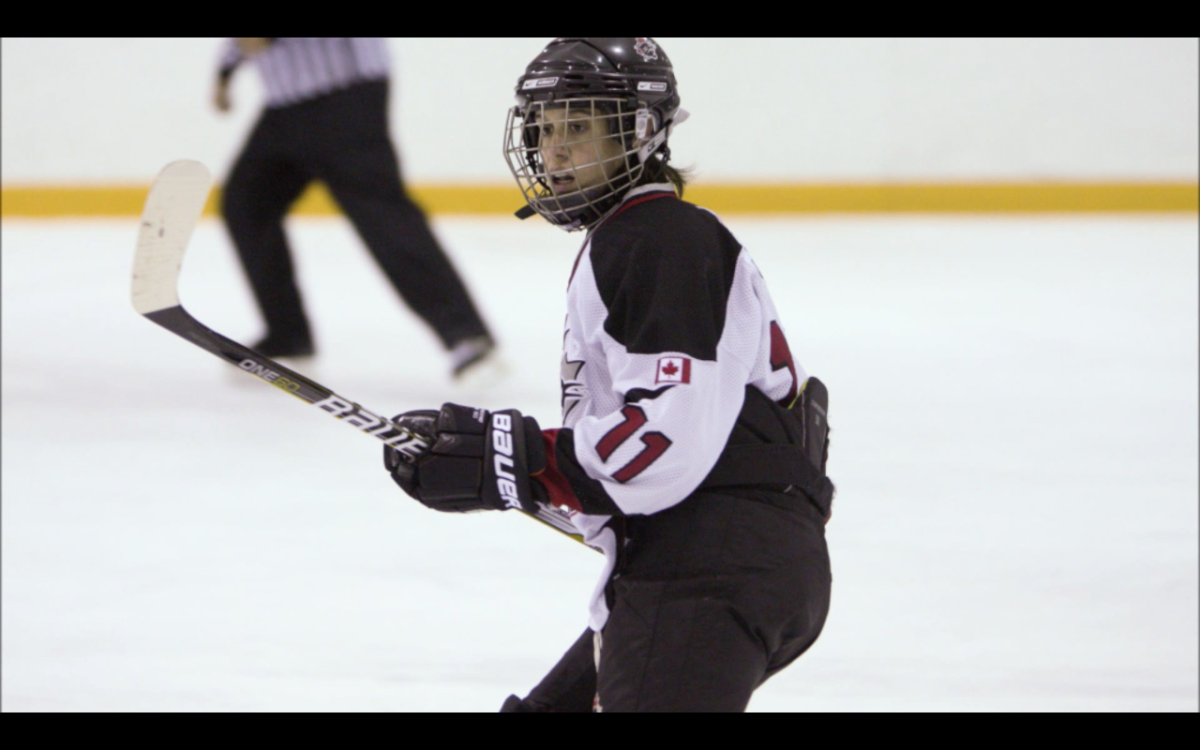Jenna Pietrantonio remembers the day vividly: it was a Monday night and she took her usual position as centre at her 9 p.m. hockey game.

While looking up after receiving a pass, she and her opponent collided. It felt like “a brick wall,” Pietrantonio recalled.
“I know my head didn’t hit the ice. It was more like a whiplash kind of hit, and then I went down and the play stopped,” she told Global News.
It was 2013 – she had just suffered her second concussion. Her team won, and in the dressing room, her headache was compounded by her teammates cheering and celebrating.
“I said to my mom, I was like, ‘this could be another concussion.’ So that’s when I realized that this could be something more than your average hockey hit,” she said.
Her 2013 experience was very different from her first concussion in 2009. In her first encounter, there was no real protocol on how to move forward following her head injury. Four years later, she received a solid diagnosis a day after the incident along with a plan for her road to recovery.
Pietrantonio’s story documents how far concussion research and understanding has come. Now, Canadian doctors say they’ve developed the first points system that’ll predict how kids will recover after a concussion.
Before, doctors relied on guesswork to determine how kids would fare post-concussion. The Ottawa scientists say their new diagnosing system predicts recovery time with about 93 per cent accuracy.
The doctors out of the Children’s Hospital of Eastern Ontario (CHEO) hope their clinical prediction score will be rolled out in hospitals and doctors’ offices across the country.
“Before if you asked doctors how well someone is going to do, the numbers would be like flipping a coin. They were half the time right and more than half of the time wrong,” lead researcher, Dr. Roger Zemek, told Global News.
“Our study showed that by asking a couple of questions and doing one really brief balance test, when [doctors] were able to apply this score, they were much better in predicting how long the concussion lasts than a doctor’s own regular best guess,” he said.
READ MORE: Canadian docs release 1st national guidelines on concussion in kids
For his research, Zemek and his team collaborated with nine pediatric emergency departments across the country, from Halifax to Vancouver. About 3,000 kids between five and 18 years old who turned up in the emergency room within the first 48 hours of a head injury took part in the study.
Most of the kids were in the ER within three hours after their head injury. The size of the study makes it the biggest in the world to zero in on child concussions, Zemek says.
Zemek said each year, CHEO sees about 1,000 children suffering from a concussion – that’s about three incidents a day. Each time, concerned parents ask about how long recovery will take.
READ MORE: Panel finds helmets, mouth guards don’t prevent concussions
To build his 12-point scoring system, Zemek relied on a handful of clinical factors:
- Demographics, such as gender and age
- Medical history, such as suffering from concussions in the past, along with recovery period from those instances
- Initial symptoms, such as headaches, fatigue, memory lose or thinking problems
- Physical examination, in which kids would have to balance for about 20 seconds
Doctors carry out the scoring to determine where a child falls – one to three points puts them at “low risk” or a smooth recovery while nine to 12 points could be a red flag for a lengthier recovery that may require more treatment.
“Having these two factors is much better than what doctors were able to do beforehand, which was really stifling the progress of coming up with novel ways to treat concussion better,” Zemek said.
READ MORE: Even without concussion, head injuries still affect learning, memory, study warns
His hope is that the prediction score will be applied to doctors’ offices and even on the sidelines of kids’ sports games.
“You don’t need a fancy MRI scanner, you don’t need to do bloodwork. This is something that anyone with basic training on how to ask the questions and how to do the balance test scoring could do,” Zemek said.
But for their part, patients need to be forthright and honest. In Pietrantonio’s case, she withheld how she was feeling in 2009 out of fear she’d get pulled from the game or even out of school.
“I didn’t tell anyone for the longest time because obviously I wanted to continue playing hockey and I didn’t want to stop playing school sports. So I waited about a few months, and even though I had headaches every day,” she told Global News.
In her 2013 incident, she went to school and felt nauseous while battling migraines.
“I was dizzy. I couldn’t really walk straight,” she recounted. Her teacher pulled her aside to ask if she was okay. That’s when her parents took her to the emergency department at CHEO.
“Not telling my parents was probably my worst decision I have ever made.”
The CHEO full findings were published Tuesday in the Journal of the American Medical Association.
carmen.chai@globalnews.ca
Follow @Carmen_Chai






Comments